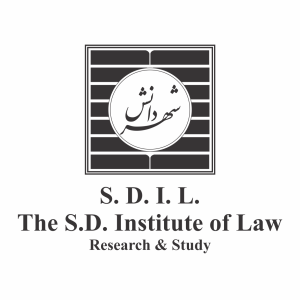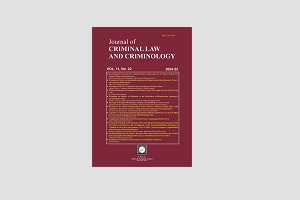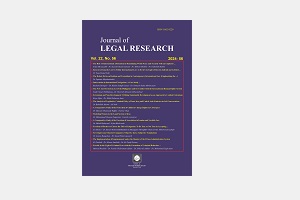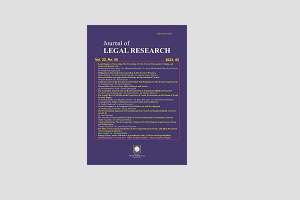Journal of
Criminal Law and Criminology
Number 15
Vol. VIII ● No. 1
Spring – Summer 2020
Managing Editor: Vahid Eshtiagh
Editor-in-Chief: Mohammad Ashoori
CONTENTS
Defendant’s Silence Connection with the Principle of Self-Incrimination and its Safeguards in Criminal Law of Iran and United States Jurisprudence
Dr. Javad Salehi
Convergence and Divergence of Counter-Terrorism Financing Rules in Iranian, Afghan and International Documents
Hamidreza Dabirzadeh & Dr. Ahmad Haji Deh Abadi & Dr. Hassan Poorbafrani
The Challenges of Decriminalization and Their Resolutions
Mohammad Ghaffari & Dr. Rahim Nobahar
Evolution of Retribution of Superior Criminal Responsibility in International Law
Dr. Seyyed Ghasem Zamani & Hossein Askarirad
Preventing Bank Offenses through Promoting Social Responsibility
Dr. Ramin Alizadeh & Dr. Hossein Gholami
The Right to Counsel for the Accused on the Procedure of the UN Human Rights Committee
Seyyed Mostafa Mousavi Mirkalaei & Dr. Bagher Shamloo & Dr. Iraj Goldooziyan
Judicial Supervision in the Pretrial Stage; Comparing Iran’s Criminal Procedure and International Criminal Court
Dr. Hosein Abdi & Dr. Mohammadali Ardabili
Criticism on the Special Criminal Courts in Iran
Ali Dehghani & Dr. Mohammad Ashouri
A Criminological Study of the Effective Internal Factors on Committing Crimes against Humanity
Dr. Samira Golkhandan & Dr. Mohamad Ali Haji Dehabadi
Analyzing the Draft Convention on Crimes against Humanity
Dr. Haleh Hosseini Akbarnejad & Dr. Hoorieh Hosseini Akbarnejad
Mutual Legal Assistance in Cybercrimes
Toghan Nezami Narjabad & Dr. Leila Raisi
Analysis of the Penal Code for Unauthorized Users of Water, Electricity, Telephone, Sewage and Gas with Emphasis on Water and Wastewater
Sadaf Davarpour & Hasan Shahravi
ABSTRACTS
Defendant’s Silence Connection with the Principle of Self-Incrimination and its Safeguards in Criminal Law of Iran and United States Jurisprudence
Dr. Javad Salehi
Associate Professor of Law Department, Payam-e-Noor University, Tehran, Iran
Abstract:
Defendant’s right to silence is a guarantee of his defense rights and is in direct connection with the principle of Self-Incrimination. This situation is different by requirements function in criminal law of Iran and United States Jurisprudence. Study of the relationship between the right to silence and the principle of self-incrimination in criminal law of Iran and the United States Jurisprudence, and precondition for the detention of the accused and how it is cited in the conviction of the accused, with regard to possible safeguards, is subject of this article. Main question of this research is what is the relationship between the principle of self-incrimination and the declaration of the right of silence to the accused in criminal law and its safeguard? Findings of this research show that the principle of self-incrimination and the observance of the defendant’s right to silence are both parts of fair trial’s coin. Observance of the right to silence and the principle of self-incrimination are separate in Iran’s criminal law and non-distorted based on their own, but are not subject to any preconditions. United States Jurisprudence have interpreted the principle of Self-Incrimination as set forth right to silence in the fifth Constitution Amendment, and they are subordinate to same guarantee of insubstantiated statements made by the accused, but believes precondition for them.
Keywords: Principle of Self-Incrimination, Defendant’s Right to Silence, Jurisprudence, Iran’s Criminal Procedure Code, United States Fifth Constitution Amendment.
Convergence and Divergence of Counter-Terrorism Financing Rules in Iranian, Afghan and International Documents
Hamidreza Dabirzadeh
Ph.D. Student in Criminal Law and Criminology, Faculty of Law, Islamic Azad University, Qeshm Branch, Hormozgan, Iran
&
Dr. Ahmad Haji Deh Abadi
Associate Professor, Ph.D. of Criminal Law and Criminology, Faculty Member of Department of Law, Faculty of Law, University of Tehran, College of Farabi, Qom, Iran
&
Dr. Hassan Poorbafrani
Associate Professor, Ph.D. of Criminal Law and Criminology, Faculty Member of Department of Law, Faculty of Administrative Sciences and Economics, Isfahan University, Isfahan, Iran
Abstract:
In the field of international law it is the norms and requirements that are addressed in the UN Security Council Resolution 1373 (2001) (which is required by Article 25 of the United Nations Charter) and the Convention on the Suppression of the Financing of Terrorism (1999) Search. Other data provided by the Anti-Terrorism Financing Act (2004) in Afghanistan, as well as the Anti-Terrorism Financing Act (2015) and the Amending the Anti-Terrorism Financing Act (1397), which are not in conflict with the law and the Constitution. A law is in place to finance terrorism. The findings of this article confirm the relative convergence between Iranian and Afghan criminal law, but divergence can be summarized as follows: First. Technical deficiencies in the 1999 Convention that are not evident in the laws of Afghanistan and Iran. These include: 1) failure to provide sufficient scientific precautionary principles in the convention; 2) addressing the subject matter and failure to provide the necessary method for the discovery of the crime and prosecution and trial separately; Second, Take necessary measures to prevent terrorist acts, including providing timely warnings to other countries through the exchange of information.
Keywords: Terrorism, Financing, Terrorist Organization, International Crime.
The Challenges of Decriminalization and Their Resolutions
Mohammad Ghaffari
Ph.D. Candidate in Criminal Law and Criminology, Islamic Azad University, South Tehran Branch, Tehran, Iran
&
Dr. Rahim Nobahar
Associate Professor, Faculty of Law, Shahid Beheshti University, Tehran, Iran
Abstract:
Decriminalization is often accepted in different criminal law systems due to its philosophical-moral foundations. However, less attention is paid to the challenges of decriminalization. The aim of this article is to defend decriminalization in a framework while evaluating its challenges. There are some bases that support decriminalization. Among them are inefficiency of criminalization in controlling criminality, insistence of Human Rights and Islamic teachings on minimum interference in the rights and freedoms of citizens and the necessity of morality development through the elimination of external restrictions and coercions. Decriminalization, meanwhile, may violate the rights of victims and defendants. According to the findings of this research, it is possible to overcome these challenges through providing non-criminal sanctions such as civil, administrative and insurance ones in order to protect victims. There is, also, room for generalizing the rules of fair trial to non-criminal cases. Therefore, decriminalization is not only acceptable with regard to unnecessary crimes, but also necessary in some cases.
Keywords: Decriminalization, Social Control, Criminal Matters, Victim’s Rights, Defendant’s Rights.
Evolution of Retribution of Superior Criminal Responsibility in International Law
Dr. Seyyed Ghasem Zamani
Professor, Department of Public and International Law, Faculty of Law and Political Sciences, Allameh Tabataba’i University, Tehran, Iran
&
Hossein Askarirad
Ph.D. Student in International Law, Faculty of Law, Divinity and Political Science, Islamic Azad University, Science and Research Branch, Tehran, Iran
Abstract:
The concept of Superior Responsibility is well rooted in the history of clashes and confrontations of states, nations and civilizations. Historically the norm of “might is right” had justified the acts of the superior state regardless of the probable criminal nature of the deeds. This could be well applied to the colonial history of the west since 17th century. The mere superiority in power, precisely the military capabilities, sufficed to provide carte blanche for intrusion without accountability. There have been regional and international efforts to improve the drastic lack of responsibility by powerful states; the principle of Westphalia Sovereignty was the first European attempt to improve the matter. Nonetheless outside Europe, the irresponsible modus operandi remained a reality for the colonized states. Furthermore, in 1800s the Act of State doctrine in the US came into existence. The two doctrines remain the sole sources of the discourse until the First World War it was between the two world wars that the challenges of the discourse of responsibility versus irresponsibility was once again brought into the attention. The Nuremberg Charter, for the first time, put an end to the rhetoric in favor of the irresponsibility theory by acknowledging that: “the official position of defendants, shall be considered as freeing them from responsibility.”
The aforesaid phrase became the cornerstone of the Attributing Responsibility. Also, inferiors and soldiers deemed as responsible due to the fact that, they were human before being soldiers. Under the Charter, the superiors were also taken responsible not only for their own direct orders and acts, but also vicariously liable for the acts of their inferiors. The superior has been defined as army commander or civil superior. Hence such responsibility should not be limited only to military personnel, as it should also be held applicable to the politicians.
Keywords: Superior, Inferior, Criminal Liability, Statute of the International Criminal Court.
Preventing Bank Offenses through Promoting Social Responsibility
Dr. Ramin Alizadeh
Ph.D. in Criminal Law and Criminology, Legal Expert of Refah Kargaran Bank, Associate Professor of Islamic Azad University, Ardabil Branch, Ardabil, Iran
&
Dr. Hossein Gholami
Professor of Criminal Law and Criminology, Faculty of Law and Political Sciences, Allameh Tabataba’i University, Tehran, Iran,
Abstract:
Corporate social responsibility (banks) is one of the important banking system issues which one of its effects is preventing banking crimes. Implementation of social responsibility principles and disciplines is of high importance in banks. Actually, “social responsibility’ pattern is a managerial expression, when exercising, crimes and banking crimes reduction is one of its functions. Actually CSR or corporate social responsibility is commitment of business sector for cooperating in sustainable economic development through working with staff, family and society for improving the quality and in this regard ISO 26000 and equator principle in 10 articles following social standardization of banks which today are accepted by 68 international banks, could be referred to. Therefore, in fact corporate social responsibility or CSR is a managerial discussion which entered into law, as well. Since it is a prevention mechanism and could be used in banking laws, as well. Prevention system caused by corporate social responsibility also is a self-regulation mechanism which is considered as one of the most important noncriminal techniques. In this paper, there is an attempt to study its role in preventing banking crimes through descriptive-analytical method aiming to express social responsibility.
Keywords: Social Responsibility, Bank Offenses, Equator Principle, ISO 26000.
The Right to Counsel for the Accused on the Procedure of the UN Human Rights Committee
Seyyed Mostafa Mousavi Mirkalaei
Ph.D. Student in Criminal Law and Criminology, Law Department, Islamic Azad University, Gorgan Branch, Golestan, Iran
&
Dr. Bagher Shamloo
Associated Professor of Criminal Law and Criminology, Faculty of Law, Shahid Beheshti University, Tehran, Iran
&
Dr. Iraj Goldooziyan
Full Professor in Criminal Law and Criminology, Law Department, Islamic Azad University, Gorgan Branch, Golestan, Iran
Abstract:
Today, the right to counsel for the accused is recognized in the course of criminal proceedings in most legal systems. International law pursues this right along with other human rights. International law has focused on the right to counsel at two levels: First that, international courts, such as the International Criminal Court, apply these rules in their own rules of procedure and in their own practice; and Second that, states in their national legal systems don’t fail to grant this right to the accused. International law has established bodies to ensure human rights at the level of states. One of these bodies is the Human Rights Committee, which has formed according to the International Covenant on Civil and Political Rights (1966). This article intends to investigate the right to counsel in the Procedure of the Human Rights Committee. The outcome of this writing is that the Committee develops the right to counsel and interprets the right to defense set forth in the Covenant to the right to counsel with many of its requirements.
Keywords: Right to Counsel, Human Rights, Fair Trial, Procedure, Human Rights Committee.
Judicial Supervision in the Pretrial Stage; Comparing Iran’s Criminal Procedure and International Criminal Court
Dr. Hosein Abdi
Ph.D. Graduate Candidate, Faculty of Law, Theology and Political Sciences, Islamic Azad University, Science and Research Branch, Tehran, Iran
&
Dr. Mohammadali Ardabili
Professor of Criminal Law and Criminology, Faculty of Law, Shahid Beheshti University, Tehran, Iran
Abstract:
One of the aspects of the fair trial, along with the principles of “respect for human rights” and “respect for ethics”, is the existence of a proper structure in the process of criminal procedure. Structurally, two models are currently closed and open to criminal proceedings in different countries. In closed packages, an officer in the preliminary investigation stage (prosecution stage) is not in a position to exercise judicial remedies that conflicts with the right of individuals to privacy and their freedom (such as the inspection of homes and interim detention orders), and actions the above is available to an independent and impartial judiciary who has not been involved in conducting investigations and gathering grounds for crime. While in the open pattern, the investigating officer will decide on the above actions. The International Criminal Court model is a closed model because the prosecutor of the court in the above acts is under the supervision of an institution called the “Elementary Branch”, while the Iranian pattern has always been an open pattern. The Code of Criminal Procedure, approved in 2013, is also emphasized on the open model. The realization of fair trial standards as well as the global tendency towards a model of the package requires the creation of a closed model in Iran, and the International Criminal Court model is considered to be an appropriate criminal procedure design for Iran.
Keywords: Closed Pattern, Open Pattern, Privacy, Right to Freedom, Initial Investigations, International Criminal Court.
Criticism on the Special Criminal Courts in Iran
Ali Dehghani
Ph.D. Student in Criminal Law and Criminology, Faculty of Law, Theology and Political Sciences, Islamic Azad University, Science and Research Branch, Tehran, Iran
&
Dr. Mohammad Ashouri
Professor of Criminal Law and Criminology, Faculty of Law, Theology and Political Sciences, Islamic Azad University, Science and Research Branch, Tehran, Iran
Abstract:
The establishment of specialized courts may jeopardize the principle of equality of treatment with the courts, as enshrined in international human rights instruments. These documents do not preclude the establishment of specialized courts; Although, in the wind it seems that the formation or existence of special courts violates the right to equality before the court; however, it seems that in certain segments of society in terms of special conditions and obligations to the community and the specialized nature of their offenses, the existence of such references provided that fair trial standards and criteria are required, such courts exist in most countries. Compared to other specialized courts, they can be regarded as non-violations of equality before the court if they comply with all the requirements of a fair trial similar to that of ordinary courts. Iran’s Criminal Procedure Code has taken a transformative approach to individual courts and has approached these trials in a charged manner, making revolutionary and military courts subject to the procedure of public criminal courts. The Criminal Procedure Code adopted in 2013 has taken steps to increase the number of crimes within the jurisdiction of the revolutionary courts, but has made the proceedings in these courts subject to the general rules of procedure.
Keywords: Special Courts, Fair Trial, Criminal Procedure Act, International and Regional Documents.
A Criminological Study of the Effective Internal Factors on Committing Crimes against Humanity
Dr. Samira Golkhandan
Assistant Professor in Criminal Law and Criminology Department, Faculty of Law, Islamic Azad University, Khomein Baranch, Markazi, Iran
&
Dr. Mohamad Ali Haji Dehabadi
Associate Professor in Criminal Law and Criminology Department, Faculty of Law, University of Qom, Qom, Iran
Abstract:
The crimes committed against humanity are amongst the clear violations of criminal international law and extra ordinary forms of collective violence which were not in the focus of criminologists for a long time, since the prosecution, trail and punishment of those committing these crimes did not prevented them from perpetrating crimes, studying the criminological nature of these crimes to knowing reasons and factors of committing these crimes could be a good help for international criminal justice to fight against them knowingly and to achieve an effective international criminal policy to prevent them. The present article tries to study the internal factors leading to these crimes, among which the role of the government, cultural structure, life difficult conditions, the role of national media resulting in these crimes can be mentioned.
Keywords: Crimes against Humanity, Government, Cultural Structure, Life Difficult Conditions, National Media.
Analyzing the Draft Convention on Crimes against Humanity
Dr. Haleh Hosseini Akbarnejad
Assistant Professor, Department of Law, Faculty of Social Sciences, Imam Khomeini International University, Qazvin, Iran
&
Dr. Hoorieh Hosseini Akbarnejad
Assistant Professor, Faculty of Law, Tarbiat Modares University, Tehran, Iran
Abstract:
The adoption of a Convention on Crimes against Humanity and preferably one that also updates the Genocide Convention would mark another milestone in the evolution of the international criminal justice system. In 2017 the International Law Commission (ILC) adopted 15 draft Articles and a draft Preamble. This essay examines the history of the ILC draft and analyses several of its major provisions in light of the existing corpus of international criminal law. An important question in this relation is the necessity and the innovations of the draft in spite of the ratification of the Rome Status. There are pros and cons in the comparative analyzing of the draft that examined in this article. However the Commission’s work could be enhanced and the new treaty made more robust by addressing certain deficiencies in the draft, many of which would either reinforce the jus cogens nature of the crime or enhance the preventive regime the draft seeks to bring into existence.
Keywords: Crimes against Humanity, The Draft Convention, Criminalization, Rome Statute, Responsibility.
Mutual Legal Assistance in Cybercrimes
Toghan Nezami Narjabad
Ph.D. Student in Law, Faculty of Humanities and Law, Islamic Azad University, Isfahan (Khurasgan) Branch, Isfahan, Iran
&
Dr. Leila Raisi
Associate Professor, Faculty of Humanities and Law, Islamic Azad University, Isfahan (Khurasgan) Branch, Isfahan, Iran
Abstract:
Prosecuting cybercrimes requires access to data related to criminal cyber activities. While wanted computer data which is in fact evidence of crime may be loaded on a system or a server in territory of other state. In this situation prosecutors’ access to them may cause the violation of that state’s sovereignty. Unless this is done through international cooperation with that state. Cooperation in this area is often done through mutual legal assistance. Legal assistance is a traditional and a known method of international cooperation in criminal matters. But the characteristics of cyber space and computer data affect legal assistance in cybercrimes. This essay is trying to clear the different dimensions of these effects and who they work. The characteristics of cyber space and compute data have made the usage of legal assistance important in fighting cybercrimes and also have caused the initiation of new forms of legal assistance. In addition, these characteristics have caused some problems in mutual legal assistance.
Keywords: Cyber-Crime, Legal Assistance, Computer Data, Electronic Evidence, Access to Trans-Border Data.
Analysis of the Penal Code for Unauthorized Users of Water, Electricity, Telephone, Sewage and Gas with Emphasis on Water and Wastewater
Sadaf Davarpour
M.A, Legal Expert of Water and Wastewater Company in Semnan Province, Semnan, Iran
&
Hasan Shahravi
Ph.D. Student, Law Office Manager of Water and Wastewater Company in Semnan Province, Semnan, Iran
Abstract:
These days, public services such as water, electricity, gas, etc … have become an indispensable and integral part of human life, so even living without the benefit of these services seems impossible. With the widespread need of society on the one hand and the number of crimes in this area on the other hand, the need for preventive actions and strict confrontations is increasingly felt. The Iranian legislator has also enacted numerous laws that have either been dealt with a one-by-one case basis, such as the Fair Water Distribution Act, or in a few cases as provided in articles 660 and 687 of the Islamic Penal Code Section on related crimes which have dealt with several public services such as water and electricity. The last will of the legislator in the field of public services is the law on unauthorized users of water, electricity, telephone, sewage and gas, adopted on 1396/03/10, which despite having deficiencies and uncertainties plays an important role in updating laws and removing some flaws and ambiguities of the previous rules. In this article, we tend to review this newly adopted law by emphasizing on the laws relating to water and sewage.
Keywords: Unauthorized Users, Unauthorized Branching, Public Services, Water, Sewage.





